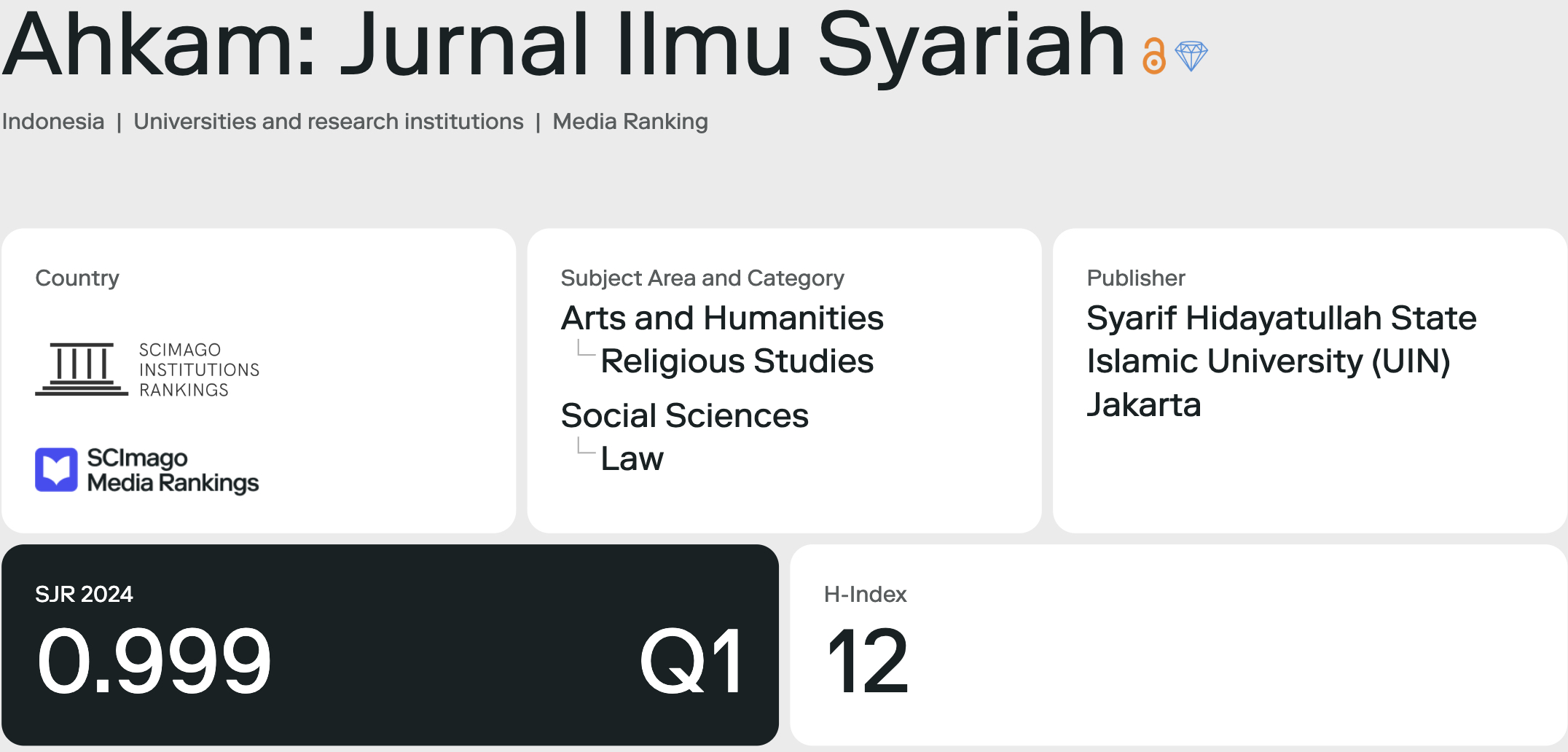Islamic Law and Customary Law in Contemporary Legal Pluralism in Indonesia: Tension and Constraints
DOI:
https://doi.org/10.15408/ajis.v23i1.32549Keywords:
Inheritance law, patrilineal, matrilineaAbstract
Legal pluralism poses a challenging issue in the application of law in society. Indonesia, as a pluralistic country with diverse ethnicities, customs, and religions, faces conflicts between legal systems. This study addressed the conflicts between Islamic law, state law, and customary law regarding inheritance within the kinship system of Indonesian society. Data were collected from court decisions and legal scholars' opinions, which were then analyzed using the theories of legal pluralism, receptio in complexu, and receptio a contrario. The study found that legal conflicts arise among customary laws within the matrilineal, patrilineal, and parental kinship systems, particularly in inheritance matters. Legal conflicts occur when faced with Islamic law, which resonates with religious practices, and state law, which applies to all citizens. Based on several court decisions, the inheritance distribution resulting from differences in legal systems, especially within the customary kinship system, is disregarded in favor of state and Islamic law. This study implies a shift in the inheritance distribution system, which is no longer purely based on the kinship system of indigenous communities.
Keywords: legal pluralism; Islamic law; state law; inheritance distribution
Abstrak
Pluralisme hukum menjadi isu yang menantang dalam penerapan hukum di suatu masyarakat. Indonesia sebagai negara plural yang memiliki perbedaan suku, adat, dan agama menghadapi pertentangan antar sistem hukum. Studi ini membahas pertentangan hukum Islam, hukum negara dan hukum adat dalam soal pembagian waris dalam sistem kekerabatan masyarakat Indonesia. Data dikumpulkan dari putusan-putusan pengadilan dan pendapat para sarjana hukum yang kemudian dianalisis dengan teori pluralisme hukum, teori receptio in complexu dan teori receptio a contrario. Studi ini menemukan bahwa terjadi konflik hukum antar hukum adat dalam sistem kekerabatan matrilineal, patrilineal, dan parental, khususnya dalam pembagian waris. Konflik hukum juga terjadi ketika dihadapkan pada hukum Islam yang menjadi afinitas masyarakat dalam beragama dan hukum negara yang menjadi hukum bagi semua warga negara. Berdasarkan sejumlah putusan pengadilan, pembagian waris akibat perbedaan sistem hukum, khususnya dalam sistem kekerabatan dalam hukum adat dikesampingkan dari hukum negara dan hukum Islam. Studi ini berimplikasi pada bergesernya sistem pembagian waris yang tidak lagi murni berdasarkan sistem kekerabatan masyarakat adat.
Kata Kunci: pluralisme hukum; hukum Islam; hukum negara; pembagian waris
References
Amin, S., Berenschot, W., Chaplin, C., Fauzanafi, M. Z., Hanani, R., Hearman, V., Jakimow, T., Febriany, V., van Klinken, G., & van der Muur, W. (2019). Citizenship in Indonesia: Perjuangan atas Hak, Identitas, dan Partisipasi. Yayasan Pustaka Obor Indonesia.
Amran Suadi, S. H., & Candra, M. (2016). Politik hukum: Perspektif hukum perdata dan pidana islam serta ekonomi syariah. Prenada Media.
Anleu, S. L. R. (2009). Law and social change. Sage.
Berman, P. S. (2009). The new legal pluralism. Annual Review of Law and Social Science, 5, 225–242.
Bowen, J. R. (2012). A new anthropology of Islam. Cambridge University Press.
Butt, S. (2010). Islam, the state and the Constitutional Court in Indonesia. Pac. Rim L. & Pol’y J., 19, 279.
Chui, W. H., & McConville, M. (2007). Research methods for law (Vol. 104). Edinburgh University Press Edinburgh.
Cleveland, W. L., & Bunton, M. (2016). A history of the modern Middle East. Hachette UK.
Constantinidis, C., Lebègue, T., El Abboubi, M., & Salman, N. (2019). How families shape women’s entrepreneurial success in Morocco: an intersectional study. International Journal of Entrepreneurial Behavior & Research, 25(8), 1786–1808.
Cribb, R. (2008). Gangsters and Revolutionaries: The Jakarta People’s Militia and the Indonesian Revolution, 1945-1949. Equinox Publishing.
Cross, M. (1971). On conflict, race relations, and the theory of the plural society. Race, 12(4), 477–494.
Das, V. (1984). For a folk-theology and theological anthropology of Islam. Contributions to Indian Sociology, 18(2), 293–300.
Dasor, Y. W., & Hermaditoyo, S. (2020). Revitalisasi Peran Lembaga Adat Dalam Penanganan Konflik Sosial: Studi Di Manggarai Nusa Tenggara Timur Revitalization Of The Role Of Indigenous Agencies In Handling Social Conflicts: Study In Manggarai East Nusa Tenggara Yohanes Wendelinus Dasor Dan St. J. Sosio Konsepsia, 9, 213–228.
Djanuardi, H. K., Rachmainy, L., & Mulyanto, D. (2021). Settlement Of Customary Inheritance Dispute Cases According To Sharia (Islamic Law) In Indigenous Communities In Indonesia. NVEO-NATURAL VOLATILES & ESSENTIAL OILS Journal| NVEO, 807–818.
Dror, Y. (1958). Law and social change. Tul. L. Rev., 33, 787.
du Plessis, L. M. (1985). Kroniek: Law, race amd ethnicity in a plural society. Journal for Juridical Science, 10(1), 89–93.
Duncan, B. A. (2010). Cocoa, marriage, labour and land in Ghana: Some matrilineal and patrilineal perspectives. Africa, 80(2), 301–321.
El-Zein, A. H. (1977). Beyond ideology and theology: the search for the anthropology of Islam. Annual Review of Anthropology, 6(1), 227–254.
Fauzi, M. Y. (2016). Legislasi Hukum Kewarisan di Indonesia. Ijtimaiyya: Jurnal Pengembangan Masyarakat Islam, 9(2), 53–76.
Gebeye, B. A. (2017). Legal theory in Africa: between legal centralism and legal pluralism. Queen Mary Law Journal.
Griffiths, J. (1986). What is legal pluralism? The Journal of Legal Pluralism and Unofficial Law, 18(24), 1–55.
Hakim, M. L. (2016). Keadilan kewarisan Islam terhadap bagian waris 2: 1 antara laki-laki dengan perempuan perspektif filsafat hukum Islam. Jurnal Ilmu Hukum, 3(1), 2.
Haniru, R. (2014). Hukum Waris Di Indonesia Perspektif Hukum Islam Dan Hukum Adat. Al-Hukama: The Indonesian Journal of Islamic Family Law, 4(2), 456–474.
Hasan, M. (2023). Construction of Modern Islamic Inheritance Law based on Ijtihad of the Judges at the Religious Court of Pontianak, West Kalimantan. Samarah: Jurnal Hukum Keluarga Dan Hukum Islam, 7(2), 650–668.
Hendrako, E. (2015). Hak waris anak perempuan terhadap harta peninggalan (studi kasus putusan ma ri no. 4766/pdt/1998). Lex Privatum, 3(1).
Hosen, N. (2005). Religion and the Indonesian constitution: a recent debate. Journal of Southeast Asian Studies, 36(3), 419.
Hutchinson, T., & Duncan, N. (2012). Defining and describing what we do: Doctrinal legal research. Deakin L. Rev., 17, 83.
Ikhwan, I. (2022). The contribution of LWC Van Den Berg’s thoughts in Dutch Colonial Legal Politics on the development of religious courts in Indonesia. AJIS ACADEMIC JOURNAL OF ISLAMIC STUDIES, 7(1).
Ilyas, I., Rani, F. A., Bahri, S., & Sufyan, S. (2023). The Accommodation of Customary Law to Islamic Law: Distribution of Inheritance in Aceh from a Pluralism Perspectives. Samarah: Jurnal Hukum Keluarga Dan Hukum Islam, 7(2), 897–919.
Irianto, S. (2016). Pluralisme hukum waris dan keadilan perempuan. Yayasan Pustaka Obor Indonesia.
Islam, M. H. (2018). Islamic Law in Indonesia. Asy-Syari’ah: Jurnal Hukum Islam, 4(1), 31–50.
Ismiranto, D. (2019). Asas Monogami dalam Sistem Hukum Perkawinan di Indonesia dan Tunisia. Negara Dan Keadilan, 8(1).
Junaidy, A. B. (2013). Competing for inheritance: the contestation between Islam, adat and modernity in inheritance distribution in Indonesia. Journal of Indonesian Islam, 7(3), 427–432.
Kasim, F. M., & Nurdin, A. (2020). Study of sociological law on conflict resolution through Adat in Aceh community according to Islamic law. Samarah: Jurnal Hukum Keluarga Dan Hukum Islam, 4(2), 375–397.
Khairunnisa, A. A. (2018). Penerapan Prinsip-Prinsip Hak Asasi Manusia Dalam Pembentukan Produk Hukum Oleh Pemerintah Daerah. Jurnal MP (Manajemen Pemerintahan), 65–78.
Khoury, C. (2020). Beyond Religious Marriages: Civil Marriage, Civil Family Laws, and the Enhancement of Women’s Rights in Lebanon. Kohl: A Journal for Body and Gender Research, 77–89.
Lev, D. S. (1972). Islamic courts in Indonesia: A study in the political bases of legal institutions (Vol. 12). Univ of California Press.
Lockwood, D. (2018). Race, Conflict, and Plural Society 1. In Race and racialism (pp. 57–72). Routledge.
Maldonado, J. K., Colombi, B., & Pandya, R. (2016). Climate change and Indigenous peoples in the United States. Springer.
Maria Kyed, H. (2009). The politics of legal pluralism: state policies on legal pluralism and their local dynamics in Mozambique. The Journal of Legal Pluralism and Unofficial Law, 41(59), 87–120.
Masâ, M. (2018). The Application Of Islamic Law At The Colonial Age And It’s Implication For The Indonesian Religious Justice System. Journal of Islamicate Studies, 1(2).
Meerschaut, K., Gutwirth, S., & Eva, B. (2008). Legal pluralism and Islam in the scales of the European Court of Human Rights: The limits of categorical balancing. In Conflicts between fundamental rights (pp. 431–465). Intersentia.
Moghadam, V. M. (2022). Institutions, feminist mobilizations, and political economy: Debating equal inheritance in Tunisia. British Journal of Middle Eastern Studies, 1–18.
Morgan, T. D., & Tuttle, R. W. (1994). Legal Representation in a Pluralist Society. Geo. Wash. L. Rev., 63, 984.
Muslih, M. (2019). Perbandingan Prosedur Perkawinan Adat Baduy dengan Kompilasi Hukum Islam. Kanun Jurnal Ilmu Hukum, 21(3), 437–458.
Mustomi, O. (2017). Perubahan tatanan budaya hukum pada masyarakat adat Suku Baduy Provinsi Banten. Jurnal Penelitian Hukum E-ISSN, 2579, 8561.
Mutawali, M. (2021). The Dialectics of Customary Law and Islamic Law: An Experience from Dou Donggo Customs of Bima, Indonesia. AHKAM: Jurnal Ilmu Syariah, 21(1).
Muthmainnah, M., & Santoso, F. S. (2019). Akibat Hukum Harta Bersama Perkawinan Dalam Pewarisan Di Indonesia Analisis Komparatif Hukum Islam Dan Hukum Adat. Ulumuddin : Jurnal Ilmu-Ilmu Keislaman, 9(1), 81–96. https://doi.org/10.47200/ulumuddin.v9i1.286
Piri, M. T. (2013). Perlindungan Hukum Terhadap Tindakan Eksploitasi Anak (Kajian Undang-Undang Nomor 23 Tahun 2002). Lex Administratum, 1(2).
Rahman, A., & Janur, N. A. (2022). Comparative Study of the Concept of the Welfare State According to Liberal, Islamic and the 1945 Constitution. Jurisprudentie: Jurusan Ilmu Hukum Fakultas Syariah Dan Hukum, 9(2), 196–209.
Rahman, F. (2021). Kerangka Hukum Perlindungan Data Pribadi Dalam Penerapan Sistem Pemerintahan Berbasis Elektronik Di Indonesia. Jurnal Legislasi Indonesia, 18(1), 81–102.
Ramadhan, S. S. (2023). Sistem Penyelesaian Kasus Perusakan Tanaman Oleh Hewan Ternak Menurut Hukum Adat (Studi Kasus Di Kecamatan Jaya Kabupaten Aceh Jaya). UIN Ar-Raniry Fakultas Syariah dan Hukum.
Rex, J. (1959). The plural society in sociological theory. The British Journal of Sociology, 10(2), 114–124.
Rohmah, S., & Alfatdi, A. R. (2022). From Living Law to National Law: Theoretical Reconstruction of Applying Islamic Law in Indonesia. Peradaban Journal of Law and Society, 1(1).
Saeed, A. (2008). Some reflections on the Contextualist approach to ethico-legal texts of the Quran. Bulletin of the School of Oriental and African Studies, 71(2), 221–237.
Salim, A. (2015). Contemporary Islamic law in Indonesia: Sharia and legal pluralism. Edinburgh University Press.
Salim, M. (2017). Bhinneka tunggal ika sebagai perwujudan ikatan adat-adat masyarakat adat nusantara. Al Daulah: Jurnal Hukum Pidana Dan Ketatanegaraan, 6(1), 65–74.
Shah, P. (2005). Legal Pluralism in Conflict: coping with cultural diversity in law. Psychology Press.
Shah, P. (2020). Introduction: From Legal Centralism to Official Lawlessness? In The Challenge of Asylum to Legal Systems (pp. 1–11). Routledge-Cavendish.
Shariff, F. (2008). Power Relations and Legal Pluralism: An Examination of ‘Strategies of Struggles’ Amongst the Santal Adivasi of India and Bangladesh. The Journal of Legal Pluralism and Unofficial Law, 40(57), 1–43.
Siegel, J. T. (1998). A new criminal type in Jakarta: Counter-revolution today. Duke University Press.
Simon Thomas, M. (2012). Legal pluralism and the continuing quest for legal certainty in Ecuador: A case study from the Andean Highlands. Oñati Socio-Legal Series, 2(7).
Swenson, G. (2018). Legal pluralism in theory and practice. International Studies Review, 20(3), 438–462.
Tahali, A. (2018). Hukum Adat Di Nusantara Indonesia. Jurnal Syariah Hukum Islam, 1(2), 68–84.
Tamanaha, B. Z. (2008). Understanding legal pluralism: past to present, local to global. Sydney Law Review, 30(3), 375–411.
Tamanaha, B. Z. (2011). The rule of law and legal pluralism in development. Hague J Rule Law 3 (1): 1–17.
Tono, S., Syibly, M. R., Mu’allim, A., Nurozi, A., & Purwanto, M. R. (2019). The harmonious relationship between Minangkabau custom and Islam in the distribution of inheritance. Al-Shajarah: Journal of the International Institute of Islamic Thought and Civilization (ISTAC), 39–55.
Vinyeta, K., Whyte, K., & Lynn, K. (2016). Climate change through an intersectional lens: gendered vulnerability and resilience in indigenous communities in the United States.
Wahib, A. B. (2014). Reformasi hukum keluarga di dunia Muslim. Ijtihad: Jurnal Wacana Hukum Islam Dan Kemanusiaan, 14(1), 1–19.
Yilmaz, I. (2021). Muslims, Sacred Texts, and Laws in the Modern World. Handbook of Contemporary Islam and Muslim Lives, 19–37.
Zubair, A., & Latif, H. (2022). The Construction of Inheritance Law Reform in Indonesia: Questioning the Transfer of Properties through Wasiat Wājibah to Non-Muslim Heirs. Samarah: Jurnal Hukum Keluarga Dan Hukum Islam, 6(1), 176–197.
Zuhdi, M. (2018). Challenging moderate Muslims: Indonesia’s Muslim schools in the midst of religious conservatism. Religions, 9(10), 310.








